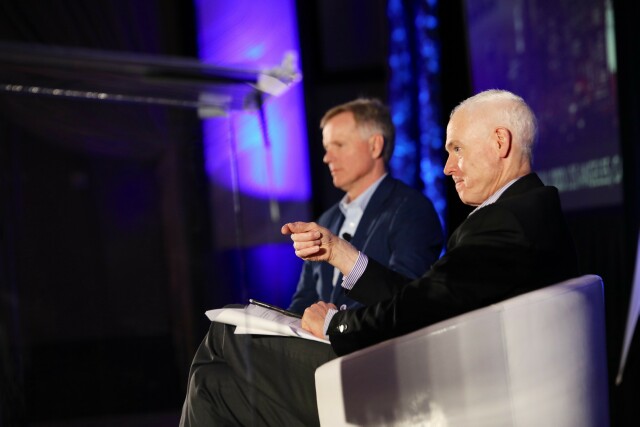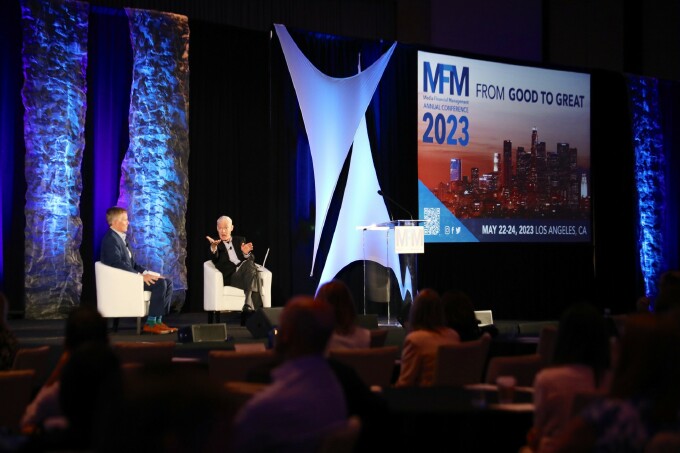Jim Collins and MFM Chair Dave Bestler Answer MFM Conference Attendees' Small Group Questions

In Part 1 of this two-part series, we learned why MFM sought out business expert/author Jim Collins to keynote the Opening General Session during its 63rd Annual Conference, held in Los Angeles from May 21-24. Not only did Collins share his discoveries around the key differentiators between good and truly great companies, he had conference participants break into small groups and come up with the most challenging questions they derived from his first 75 minutes on stage. There were so many that the lights came up to signal the end of the session before he could call on each group. Collins (pictured above, right) wisely invited Dave Bestler (left), CFO of Hubbard Radio and MFM Chairman, to join him on the stage to get additional insight and context from someone who has spent the vast majority of his career in media finance.
One of the most burning questions stemmed from Collins’ urging people to prioritize and say no more often and more effectively: "A to-do list is only effective if you have a 'stop doing' list," he said.
The first group asked, "What's at the top of your 'stop doing' list?"
Collins led the response, saying he follows two principals: "First, I have my '20-minute rule.'" He explained that if he wakes up in the middle of the night and can't fall back asleep within 20 minutes, he gets out of bed and does some deep, quiet work until he feels tired enough to return to bed. Second, he said, is to "stop taking so long to say no." In other words, when he finds himself waffling on a request, that tells him he should probably turn it down.
Bestler added: "Stop talking so much; stop texting when you should have a phone conversation." He noted that after the COVID pandemic ended, some of Hubbard's customers were reluctant to re-engage. "The core of what we do is connect listeners and viewers as clients," he said. "We needed to invite them back."

Another question that came in different forms from the small groups was around Collins' "turning the flywheel" concept. "You're at a nine on the flywheel except for one thing that's a three. How do you remedy that?" asked the leader of one small group.
Collins' response? "Almost everyone in an organization is a part of the flywheel. You're part of the overall strategic architecture of the company. Once you find your place on the flywheel you have to improve. It's about disciplined people having disciplined discussions."
A related question came from another small group: "How do we build a flywheel model that creates a culture that can adapt to change?" Collins responded, "First off, we need to work on the flywheel together," he said, but then followed with, "Where would our flywheel start?" and "How do we build momentum to get it started?" He advised that in order to make the flywheel successful, companies (and employees) first need to work on the flywheel together, and second, hire the right people to find the company's best culture.
One small group posed this question to Collins and Bestler: "How do companies take in things like artificial intelligence (AI) to plan for the future?"
"I call these 'technology accelerators,'" Collins replied. "We need to ask how we can harness this technology to accelerate our flywheel." He also noted that "good-to-great" companies like Amazon recognize they're not running a technology flywheel, but "a customer flywheel that learned to harness changes like technology to disrupt the world."
Several small groups had questions around Collins' principle of "getting the right people on the bus," part of his "Disciplined People" input in Part I of the session. "If people aren't buying in, they may not be the right people on the bus," Bestler noted.
Collins reminded the audience of another of his "Disciplined People" principles -- "Level 5 Leadership" -- which drove additional questions from the small groups, including how an individual or a team can affect change if they don't work for a Level 5 leader. "All you can do is be Level 5 for your own people," Collins said. He also advised companies to focus on their core values, and "know what they are, and hire to meet those values. You can build skills, but you can't instill values in people."
Bestler added that Hubbard continually works to create Level 5 leaders. One example is a mentorship program for its younger employees called HubbardNXT. "We identify a number of promising staff and put them in a three-month challenge program," he said. "It was the brainchild of our CEO, who operates with humility.”
"We have the opportunity to help younger people find their hedgehog -- and companies must embrace that," Collins added.
Click the social buttons to share this content with your friends and colleagues.
The opinions and points of view expressed in this content are exclusively the views of the author and/or subject(s) and do not necessarily represent the views of MediaVillage.com/MyersBizNet, Inc. management or associated writers.


